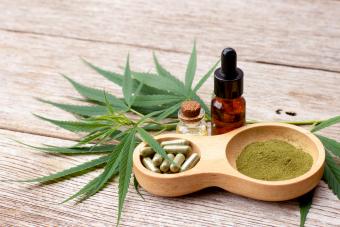
Hemp is a plant with edible seeds in the same family as the cannabis plant. Both marijuan and hemp come from the Cannibis sativa plant. While marijuana contains varying amounts of tetrahydrocannabinol (THC), hemp must contain less than 0.3% THC. Tetrahydrocannabinol is the substance that is responsible for marijuana's psychoactive properties.
Hemp is widely available and a rich source of plant protein for vegetarian and vegan dieters. While hemp protein offers numerous nutritional benefits, it's important to be aware of some potential adverse effects, including potential hemp milk dangers and hemp seeds side effects to determine if these products are right for you.
What Is Hemp Protein?
You've probably seen hemp clothing or rope in natural food stores or online. Hemp is also used to make certain protein products. In fact, hemp seeds are thought of by some as one of the most nutritionally complete food sources, according to one 2020 study.

Given its robust nutritional content, hemp seeds can be crushed to create a protein powder that can be a good source for those looking at protein supplementation.
Hemp protein powder provides about 120 calories per 1/4 cup serving, according to the USDA. It also provides 12 grams of protein, 2 grams of fat, and 13 grams of carbohydrate. Eleven grams of the carbohydrate is provided in the form of fiber. Different companies make hemp protein and formulations may vary, along with the nutrition facts.
Hemp milk is another way to take advantage of hemp protein, although in smaller amounts. A one-cup serving has about 101 calories, 2 grams of protein, 13 grams of carbohydrate, and 4.5 grams of fat.
Hemp Protein Side Effects and Concerns
Just like any other food product on the market, there are specific side effects and risks that are important to take note of.
May Contain Low Dose THC
Most hemp seeds and other hemp protein products don't contain tetrahydrocannabinol (THC), which is the component of marijuana that makes you feel "high." However, depending on how the hemp was grown and processed, it is possible to ingest small amounts of THC when consuming hemp protein.
According to the U.S. Food and Drug Administration (FDA), you may test positive for THC after consuming hemp protein -- even if the product label says it's THC-free. Therefore, athletes and professionals should be aware of this, as hemp protein could lead to positive urine drug tests.
Supplements Are Loosely Regulated
Because hemp protein powder is a dietary supplement, it isn't regulated as tightly by the FDA as foods and medications. The FDA doesn't require supplement manufacturers to prove products are safe or effective or prove the accuracy of supplement fact labels before products hit the marketplace, according to the Federal Food, Drug, and Cosmetic Act.

If problems arise after consumers use such products, the FDA can take action and remove faulty products from shelves. However, there's always a chance a protein supplement currently in stores is unsafe, contaminated with harmful substances, or contains ingredients that don't match what's listed on the label.
Can Contribute to Excess Protein Intake
Ingesting large amounts of hemp protein can be problematic if you're consuming too much protein over the course of the day. This is because your body can only use (and get rid of) so much protein at a time, and toxic by-products can build up in your bloodstream.
A 2014 issue of Today's Dietitian reports that protein intake of 200 to 400 grams daily takes a toll on your liver, affecting its ability to convert nitrogen to urea. However, one serving of hemp protein contains just 12 grams of protein, so this hemp protein side effect is not likely to be concerning unless you are consuming very large quantities.
May Cause Digestive Issues
Protein supplements (including hemp protein) can cause digestive problems due to high fiber content, according to the Cleveland Clinic. This means you could experience gas, bloating, upset stomach, constipation, or diarrhea after consuming large amounts of hemp protein. To reduce your risk of digestive problems after eating hemp, start with small servings and drink lots of water.

Might Interact With Medication
Always chat with your healthcare provider before taking any type of dietary supplement, including hemp protein - especially if you're taking medications. Supplements can interact with certain medications, and hemp protein is no exception. A case report published in 2018 suggests that oils in hemp can increase bleeding, especially in people taking anticoagulant medications.
May Cause Low Potassium
There are anecdotal reports of hemp milk dangers related to the additives that it may contain. Some brands of hemp milk are fortified with vitamin B12. The synethetic form of B12 is called cyanocobalamin. The use of cyanocobalamin in patients with low B12 levels has been linked to a condition called hypokalemia, or low potassium. Symptoms of the condition include feeling limp, leg cramps, irregular heartbeat, tingling or numbness, or muscle weakness.
Should You Try Hemp Protein?
While these hemp protein side effects and hemp milk dangers may seem concerning, it is not likely to cause problems in most people unless they have a related medical condition or allergy. If you want to include hemp protein or hemp milk in your diet, start by adding small amounts. Make a smoothie with a half serving of hemp protein powder, or add some hemp milk to your morning coffee. See how your body tolerates it and continue to add it as you feel comfortable.







